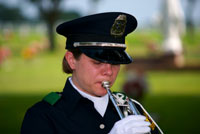Paul Baglyos, St. Paul, MN
Warm-up Question
Is Jesus dangerous and scary?
All In
Victor Barnard was extradited from Brazil by U. S. authorities earlier this summer and returned to Minnesota where he will stand trial for alleged abuses against members of Shepherd’s Camp, a cult-like commune he founded in Minnesota’s Pine County. For the story of the commune and the alleged abuses perpetrated by Barnard, including the attribution for this photograph, see: http://nymag.com/thecut/2016/06/pine-county-minnesota-sex-offender-victor-barnard.html
 Barnard’s story is similar to that of countless other predators who manage to gather a group of committed followers by using familiar methods of brainwashing. Such predators appeal to the ideals, values, and good intentions of people who are motivated to seek and to build a better world, convincing them that they – the predators – have special insight and knowledge about how to achieve that goal.
Barnard’s story is similar to that of countless other predators who manage to gather a group of committed followers by using familiar methods of brainwashing. Such predators appeal to the ideals, values, and good intentions of people who are motivated to seek and to build a better world, convincing them that they – the predators – have special insight and knowledge about how to achieve that goal.
Once a group of followers begins to form around the persuasive teaching of a predatory leader, the leader then isolates the group by physical relocation to a remote place. Social isolation accompanies physical isolation as followers are persuaded to break all former ties and relationships, especially with family members outside the group. Everyone and everything outside the group is identified as corrupt and evil; followers are taught to renounce and abandon all aspects of their former lives in favor of the new life they are building together under the direction of the leader.
Physical deprivations affecting diet and sleep are commonly used to erode any resistance on the part of the group, and punishments are commonly used to ensure compliance and conformity with the will of the leader. The true predatory intentions of the leader are shielded by claims of divinity: the leader promotes himself or herself as God or Messiah to the group, demanding unquestioned and unhesitating obedience to his or her will.
Stories like that of Victor Barnard and Shepherd’s Camp are frighteningly common, involving not only such infamous figures as Charles Manson, Jim Jones and David Koresh but many other predators far less known to the general public. Accounts of predatory leaders who form a group of followers to satisfy their own perverse ambitions are widespread in print and online media. Here are links to two examples that seek to explain this phenomenon:
http://www.huffingtonpost.com/lisa-kerr/how-cults-gain-power-over_b_3998553.html
http://www.telegraph.co.uk/news/celebritynews/9061694/How-Igot-sucked-into-a-cult.html
Discussion Questions
- Do any of you recognize the names of Charles Manson, Jim Jones or David Koresh? What do you know about them and their followers? How is Victor Barnard’s story similar to theirs?
- Read one or both of the two stories linked at the end of the previous section. Why do you think good people become followers of bad leaders?
- In what ways do such stories sound similar to Bible stories that you know or to Christian teachings you have learned? Why do you think predatory leaders commonly appeal to scripture and religious tradition?
Sixteenth Sunday after Pentecost
(Text links are to Oremus Bible Browser. Oremus Bible Browser is not affiliated with or supported by the Evangelical Lutheran Church in America. You can find the calendar of readings for Year B at Lectionary Readings
For lectionary humor and insight, check the weekly comic Agnus Day.
Gospel Reflection
The words of Jesus in this passage – especially in verse 26 – are hard to swallow. When Jesus says that discipleship means hating one’s parents, spouse, children and siblings, he sounds like the “creepy cult leader” in the news story above, or like any of the other creepy cult leaders who prey upon their followers to gratify their own perverse desires. At the end of the passage, Jesus talks about having to “give up all your possessions,” which is another of the demands that predators such as Victor Barnard commonly make upon their followers.
If we isolate this passage from the larger context of the Bible, then it becomes not only hard to swallow but downright poisonous and deadly. The last thing the world needs is more hate, and if the message of Jesus is somehow a message of hate then it doesn’t deserve even a moment of our time or an ounce of our attention.
But this passage – like all other passages in the Bible – cannot be isolated from the larger context of scripture. In order to understand these verses from the fourteenth chapter of Luke, it is important to let the entire Bible guide our interpretation.
The contemporary English word “hate” expresses extreme emotion, associated with intense anger or revulsion that can prompt a person to violence or other forms of destruction. The Greek word for “hate” in the New Testament does not have quite the same meaning, because it has more to do with the values, choices and commitments expressed in one’s actions and behaviors and less to do with intense emotion. Nevertheless, the Greek word translated into English as “hate” is a strong word, and Jesus’ use of that word should not be diluted or domesticated just to make it easier to swallow.
Neither can that troubling word “hate” in the fourteenth chapter of Luke be rightly understood apart from the one who speaks it. This is, after all, Jesus who speaks in this passage, and the meaning of the words he uses must be understood in the light of his entire life, death and resurrection. The Good News that Jesus proclaims – the Good News that Jesus is – is not about hate, but about life, hope, and the love of God for all people, without exception. Anyone who embraces that Good News and endeavors to live that Good News will find himself or herself at odds with people who would rather restrict God’s love to those they consider worthy of it.
In a world that considers only some people worthy of love, worthy of life, and worthy of hope, the radical Good News of Jesus Christ is a very odd sort of message, scarcely comprehensible. Disciples of Jesus who embrace that Good News and seek to live it fully and passionately will find themselves also regarded as odd and incomprehensible, sometimes including the people they love most dearly! In these verses from the fourteenth chapter of Luke, Jesus is telling his followers to be prepared for that, to expect it, and to be ready to persist in faith even when it makes them odd and incomprehensible to others.
Discussion Questions
- Have you ever experienced a situation in which your Christian faith made you seem odd to other people? How did you feel? What did you think? What did you do?
- Do you know anyone whose faith in Jesus Christ has led them to take a stand that alienated or estranged them from other people, maybe even other people who were very close to them?
- Can you think of something that Jesus is calling you to do as an act of discipleship that you have been reluctant to do because it might make you seem odd to other people? How might you overcome your reluctance?
Activity Suggestions
Using a concordance or electronic search (http://bible.oremus.org/ is one tool) look up other passages in the New Testament gospel narratives where the word “hate” is used. How similar or dissimilar to Luke 14:26 do those passages seem to you? As a group, list all the ways that any of you practice the kind of “hate” that Jesus associates with faith and discipleship.
Closing Prayer
Almighty and eternal God, so draw our hearts to you, so guide our minds, so fill our imaginations, so control our wills, that we may be wholly yours, utterly dedicated to you; and then use us, we pray, as you will, but always to your glory and the welfare of your people, through our Lord and Savior, Jesus Christ. Amen.
Evangelical Lutheran Worship, page 86




